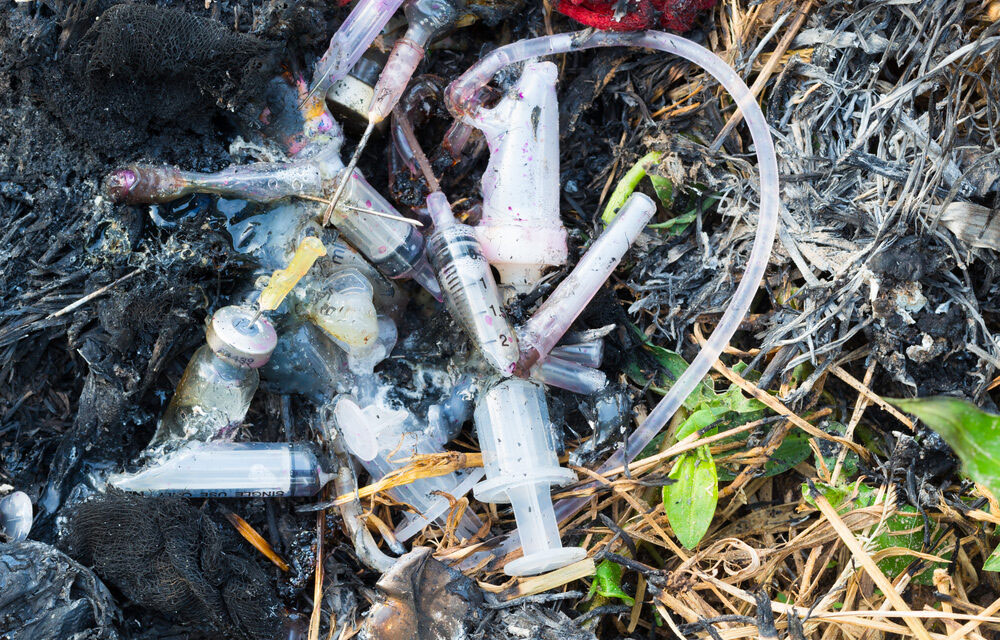Affordable Medical Waste Disposal Services for Clinics and Health centers
Affordable Medical Waste Disposal Services for Clinics and Health centers
Blog Article
Navigating Medical Garbage Disposal: Important Providers for Health Care Facilities
In the intricate landscape of healthcare operations, the management of medical waste is a critical aspect that requires careful focus. Medical care centers, whether tiny facilities or large medical facilities, are turned over with the duty of handling, treating, and disposing of a broad array of medical waste streams. The complexities associated with browsing with the regulative demands, making sure appropriate waste segregation, and implementing safe collection and transport processes are critical. Understanding the essential solutions that sustain medical waste disposal is not simply an issue of compliance however additionally a fundamental component in safeguarding public health and wellness and environmental well-being. The intricacies of this procedure are important for healthcare centers, and the expertise supplied in this world plays a pivotal role in keeping the stability of health care systems.
Regulatory Conformity Assistance
For medical care centers, making sure regulatory compliance support is crucial to preserve proper handling and disposal of clinical waste. Sticking to policies stated by organizations such as the Environmental Protection Company (EPA) and the Occupational Safety and Health Administration (OSHA) is crucial to avoid environmental contamination, safeguard public health and wellness, and stay clear of potential legal consequences. Regulative conformity support gives health care facilities with support on just how to correctly segregate, store, transportation, and take care of numerous kinds of clinical waste in conformity with regional, state, and government guidelines. This support consists of assistance in developing and implementing thorough waste administration plans, conducting regular personnel training sessions, and carrying out audits to guarantee recurring compliance. By partnering with governing conformity professionals, health care facilities can stay up-to-date on advancing policies, alleviate dangers associated with incorrect garbage disposal, and inevitably add to a safer and much more sustainable setting for all.
Waste Partition Assistance

Health care facilities need to give clear standards and training to team on exactly how to set apart waste effectively. This includes dividing basic waste from hazardous materials such as sharps, transmittable waste, drugs, and chemical waste.
Collection and Transport Solutions

Appropriate collection and transportation services are essential elements of the medical garbage disposal procedure in medical care centers. These services ensure that harmful products are taken care of safely and in conformity with policies to secure both the setting and public health and wellness. Health care centers depend on specialized waste management companies to provide effective collection and transportation services tailored to their needs.
Medical waste collection entails segregating different kinds of waste at the point of generation, utilizing color-coded bins or bags to compare general, unsafe, pharmaceutical, and other waste streams. Trained employees need to do this task to avoid contamination and make certain correct disposal. Once accumulated, the waste is moved in specialized vehicles furnished to handle dangerous products securely. These cars follow stringent safety and security criteria and comply with assigned courses to accredited treatment centers for disposal via techniques such as sterilization, landfilling, or incineration.
Therapy and Disposal Solutions
In the realm of clinical garbage disposal for health care centers, after the essential stage of collection and transportation solutions, the focus moves towards implementing effective treatment and disposal remedies. Therapy options commonly involve linked here procedures such as autoclaving, which utilizes heavy steam under stress to decontaminate the waste. home This method is commonly used for transmittable waste that should be provided non-hazardous prior to disposal. An additional widespread therapy technique is incineration, where waste goes through heats in regulated settings to decrease its volume and eliminate microorganisms.
Disposal solutions incorporate the last step in the medical waste administration procedure. Reusing and source recuperation are also getting traction as sustainable disposal options for certain types of medical waste products.
Effective therapy and disposal services are critical in making sure compliance with guidelines and protecting public wellness and the atmosphere. Healthcare centers need to thoroughly assess and choose proper methods that straighten with their waste administration objectives and sustainability campaigns.
Team Training and Education And Learning

To effectively take care of medical garbage disposal in medical care centers, thorough staff training and education play a vital role in making certain adherence to regulative requirements and keeping a secure atmosphere. Appropriate training furnishes personnel with the expertise and skills needed to handle various sorts of clinical waste, segregate them correctly, and package them safely for disposal. By informing employees on the risks linked with incorrect handling of clinical waste, centers can reduce the probability of mishaps, contamination, and regulatory violations.

Conclusion
Finally, healthcare facilities rely upon important medical waste disposal services to ensure regulative compliance, appropriate waste pop over to these guys segregation, risk-free collection and transport, efficient therapy and disposal, in addition to staff training and education. These services play an important function in maintaining the health and wellness of both health care workers and the public, highlighting the importance of correct monitoring of medical waste in healthcare setups.
For medical care facilities, making certain regulative conformity support is vital to preserve correct handling and disposal of clinical waste. Waste partition involves categorizing various types of clinical waste to make certain proper handling, therapy, and disposal. This consists of separating basic waste from harmful materials such as sharps, contagious waste, drugs, and chemical waste.Medical waste collection entails segregating different types of waste at the point of generation, making use of color-coded bags or containers to differentiate in between general, dangerous, pharmaceutical, and other waste streams.In the realm of medical waste disposal for medical care facilities, after the essential stage of collection and transport solutions, the focus changes in the direction of implementing reliable treatment and disposal options.
Report this page